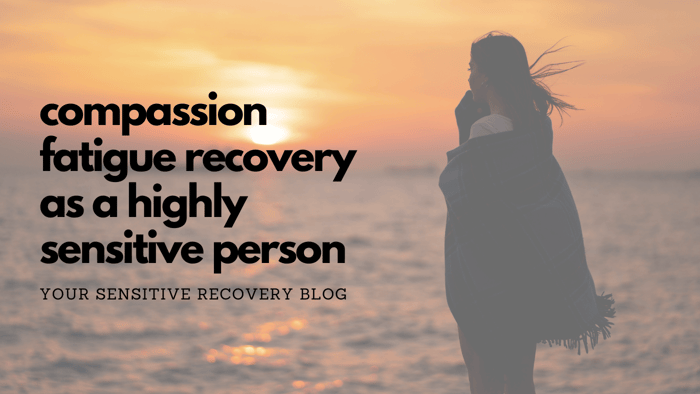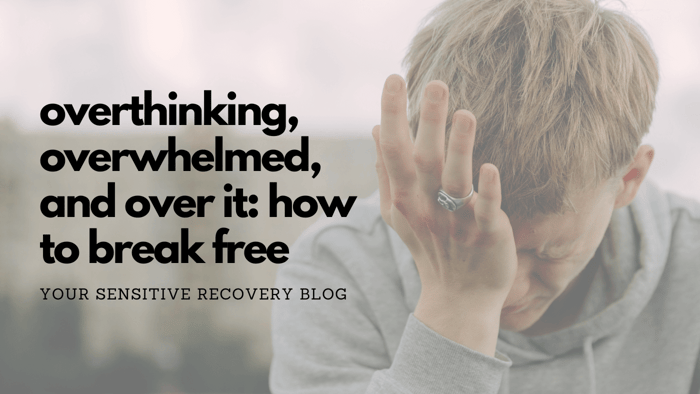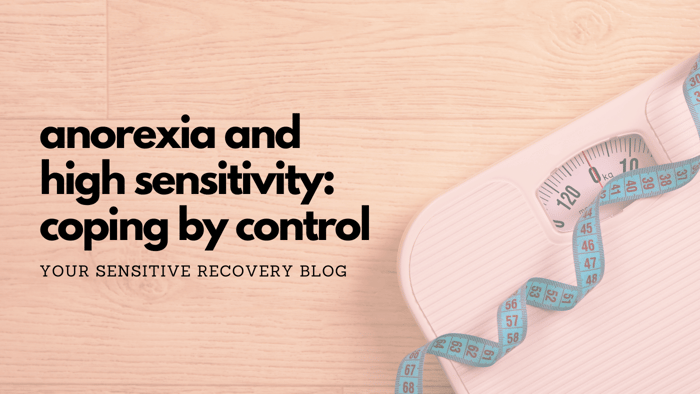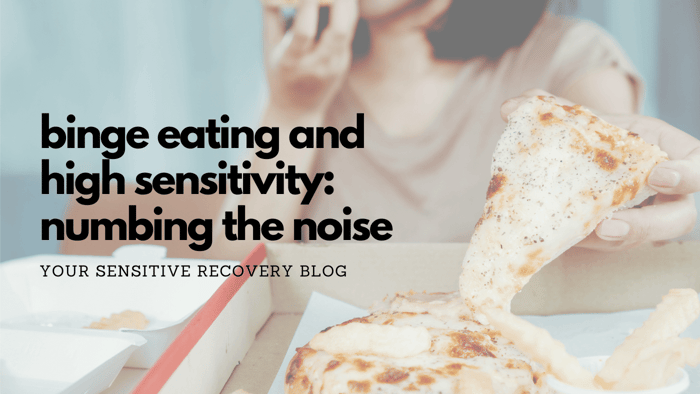As a Highly Sensitive Person, your natural, deep wellspring of compassion and empathy allows you to easily connect with the experiences and emotions of others. In so many ways this is a beautiful, beautiful gift. But when your heart is heavy, as mine is now with devastating events and situations like the currently raging Los Angeles wildfires, your sensitivity can also leave you drained, depressed, and overwhelmed. Compassion Fatigue is real and powerful, and it can affect everyone...yes, even a seasoned therapist.
In this post, I'd like to share my personal, real-time struggle with Compassion Fatigue and the practical tips I'm using that will help us both nurture our sensitive hearts and stay engaged with the world without losing ourselves in the process.
Los Angeles Wildfires and Hitting the Emotional Wall
For over a week now, the news has been inundated with footage and stories of the absolutely devastating wildfires in the Los Angeles area. As they raged, I noticed that the flame in my heart was struggling. My usually strong hunger cues were dull, my desire to connect with others was waning, and I was struggling to sleep, concentrate, and maintain my typical optimistic outlook. I hit an emotional wall and was staring Compassion Fatigue in the face.
Currently, I feel deep sadness, as well as a strange survivor's guilt - something that hit me quite unexpectedly. You see, my husband and I met in Los Angeles and called it our home for the better part of the last two decades. Slowly...and then all at once, the seemingly never-ending threat of wildfire, extreme drought, and rough air quality for my asthmatic lungs became too much. We decided to leave the West Coast in late 2022 for the green mountains of Vermont.
We missed California terribly that first year and spent our snowed-in days playing a game where we took turns listing off what we DIDN'T miss about L.A (crawling traffic, how the windows in our old apartment leaked every time it rained, the near-constant sound of leaf blowers, the way ash and soot would coat everything during fire season...). The grief hit particularly hard when shortly after moving, SoCal had the kind of wet winter that we hadn't seen since the early and mid-oughts. We wondered if we had made a mistake. We saw from friends' photos how those perma-brown hills had finally, once again become lush and beautiful.
But sadly, it didn't last. Fast-forward to last week and multiple fires were consuming parts of Los Angeles that many had assumed to be safe or at least safe-ish. Watching the news with a look of horror on our faces, we felt a mix of deep empathy, boundless sorry, gratitude...and guilt; guilt for leaving unscathed, jumping ship in a way, and for wanting to turn off the TV and put down our phones.
Getting Stuck in "Compare and Despair"
I have experienced and heard other HSPs describe this sense of guilt that arises when they choose not to consume, or choose to limit their consumption of disaster-laden media. We can feel wrong protecting ourselves by turning away. Because yes, being able to turn away is a privilege. However, continuing to consume nonstop media does not help the victims and survivors of disaster. It does not stop the crises. But it does keep our nervous systems hijacked in a way that will likely prevent us from playing a meaningful role in the support and recovery efforts. This kind of guilt can directly contribute to Compassion Fatigue.
I do believe that being an informed citizen is part of our civic duty. I also believe that there needs to be a limit to the amount of information we consume. I certainly know my nervous system longs for the days of "dumb" phones, and news that wasn't streaming 24/7.
We are more informed but more overwhelmed.Even as I sit here writing this post, a berating voice tells me I do not have the right to feel overwhelmed. I'm sure you've heard a similar voice at one time or another. Even my friends and clients currently in Los Angeles are experiencing that voice.
"I'm actually fine. So many people have it worse. It's not fair of me to cry when I haven't actually lost my home. I feel silly being so affected by this."
The critical, "inner roommate" always has something unhelpful to say. It is a painful form of gaslighting. You might feel crazy because comparing your pain to someone else's makes you question and doubt the validity of your own emotions. It is SO tiring.
Highly Sensitive People can become so fatigued not just from the unstoppable outpouring of compassion for those suffering, but also from the anxious pressure of helplessness. Should I be doing something? Should I be doing more? Should I have prepared for this better? With our depth of processing, we can get stuck in this questioning loop. Nobody is equipped to deal well with on-going pain and anxiety.
Compassion Fatigue is emotional burnout, and we either choose to start numbing our emotions, or our body does it for us.Instead of waiting for the burnout to take place, what if we practice responding gently to the critical, should-ing voice? What if we ask ourselves with genuine curiosity, "What is happening inside? What am I needing?" Maybe we'd find sadness and gratitude, rage and hopelessness. And a longing for a hug, for someone to say, "I see you, and I care."
Rekindling Hope: Coping with Compassion Fatigue
Coping with Compassion Fatigue is much like how you would cope after a traumatic event. They both involve tending to the emotional and physiological overwhelm.
Here's what I'm doing during this time to take care of myself:
- Paying attention to my physical safety. This doesn't just mean making sure I'm safe from harm (but of course that IS imperative). It also means signaling to your nervous system that you are safe by regularly eating and hydrating, sticking to normal routines as much as possible, prioritizing rest and downtime, connecting with loved ones, etc. I noticed the other day that I've been rather under-hydrated this past week. I'm consciously checking in more with myself now to see if I could use a glass of water.
- Allowing a deep acknowledgment of the impact. There is no room here for comparison. Pain is pain. Any comparing of your pain to someone else's will halt the healing process. Whether you've been impacted directly by a traumatic event or are experiencing it vicariously, let it be painful. (Did you know PTSD can develop from witnessing trauma - not just from a direct experience of it?)
- Sharing with safe people. Whether with a therapist, a friend, a support group, or a trusted family member, being able to verbalize what you're experiencing is more helpful than you might think. I attend a small, intimate acting class once a week and during our check-in, I shared about my recent grief, the grief I'm holding for my clients in Los Angeles, and how it's been affecting my day-to-day. Nobody needed to respond to what I shared. It was enough that they held space for me that evening and just acknowledged my struggle.
- Looking for the helpers. They are everywhere. We all learned this from dear Mr. Rogers, and boy is it accurate. The community of Los Angeles is rallying in a profound way. Even people who have lost all their earthly belongings are out there now volunteering to help feed and clothe others. It's nothing short of miraculous. It's the decency of the human spirit at work. As an HSP, these stories of hope and camaraderie fill my heart. Fair warning - they also produce just as many tears as the sad stuff, so I have to keep an eye on my emotional bandwidth for this as well.
- Finding ways to contribute. Whether it's money, goods, time, love...it counts. As someone who specializes in helping those recovering from trauma, it's clear to me what I can offer. But even if you don't have something tangible to give, or you're unsure where to start, calling a suffering loved one and offering a heartfelt conversation, a momentary blip of hope and laughter...a "You matter and I'm thinking of you" chat can go a long way.
- Exercising some media boundaries. Yes, this means limiting exposure to the amount of information I'm taking in. As I stated previously, being able to turn away is a privilege, so when (I say when not if) you feel guilty for limiting your exposure, simply acknowledge the privilege with genuine gratitude and then release the guilt. We are all interdependent and taking care of yourself enables you to be available for others in the great give-and-take we are all a part of.
One Foot in Front of the Other
As I reflect on my own experience of Compassion Fatigue during these recent wildfires in Los Angeles, I’m reminded that even the largest, most empathetic hearts need care and restoration - maybe even especially so. It’s not easy to admit when we’ve reached our emotional limits. But it is a powerful act of self-compassion to do so, and it enables us to begin moving forward, one foot in front of the other.
If you’re feeling overwhelmed right now, I see you, and I hope you’ll give yourself the same grace and kindness you so freely give to others. Healing from Compassion Fatigue is not about closing off your heart but learning how to balance an open heart with intentional and vital self-care.
You are worthy of peace, rest, renewal, and the gentle understanding that your sensitivity is a strength even during a crisis; especially during a crisis. Together, we can navigate the path to better days with courage, curiosity, self-compassion, and care. My thoughts are with those who are in pain right now, and if I can be a resource of comfort, support, or recovery for you during this time, please reach out.
| 🚨 To connect with someone for immediate assistance, please use these crisis lines: Suicide and Crisis Lifeline: 988 Frontline Helpline: 1-866-676-7500 Fire/EMS Helpline: 1-888-731-3473 Firefighter/Family Crisis and Support Line: 1-844-525-3473 Disaster Distress Helpline: 1-800-985-5990, or text LA to 741741 |
✨ Josie Munroe, LMFT is a licensed therapist and owner of JosieMunroe.com and Your Sensitive Recovery. As a recovered clinician and Highly Sensitive Person, she loves supporting others on their journeys to form new, empowered relationships with food, their bodies, and their sensitivity. Join the newsletter for a weekly boost of hope and inspiration. You deserve a recovery that works for you! ✨





